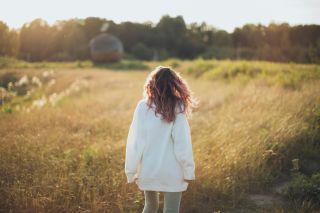Environment
Does the Outdoors Really Have Healing Powers?
Personal Perspective: Sometimes nature can nurture us in ways people can't.
Posted June 24, 2024 Reviewed by Jessica Schrader

Growing up in a chaotic, dysfunctional family, I understood at a young age that inside my house wasn’t safe. So whenever possible, I gravitated toward the outdoors and the experiences it offered: Sitting in my front yard with my face turned toward the sun. The sensation of my bare toes in damp grass. The wind gently brushing my hair. I spent hours exploring the woods behind my suburban house. I filled my pockets with smooth granite rocks and crisp autumn leaves and squeezed them for comfort.
I remember climbing giant magnolia trees, the scrapes on my knees like souvenirs that I cherished for days afterward. I remember the faith I put in those branches, how good it felt when they held me. I loved the weightlessness of my body underwater at a lake, the smell of a rainstorm, the soothing rhythm of drops hitting the windows and roof. Over the years, the world outside became another version of home, a refuge, a source of nurturing.
Before I had the language or understanding for it, I built my own wellness regimen around wild places. Outside, birds soar. Flowers bloom. Rivers rage. Mountains slice open the horizon. Waves crash against the beach and return to the sea. The natural world is constantly moving, changing, reinventing itself. Maybe, I thought, I could grow and change and reinvent my life too.
The Healing Power of Nature
The idea that nature has the capacity to heal us is not new. Hippocrates, the father of medicine in the fourth century B.C., emphasized vis medicatrix naturae, or the healing power of nature. In recent decades, scientific studies have linked exposure to the outdoors with improved mental health. In fact, a field of research called “ecopsychology” has emerged, founded on the idea that any time spent outside leads to lower stress hormones, better immune function, lower anxiety, and higher self-esteem.
The best part is that you don’t need a lot of time outdoors to see the benefits. There’s evidence that even small doses of nature—spending just 20 minutes outside—can help lower stress hormone levels, which can have a protective effect over time.
I’ll never know to what extent my time playing outdoors protected me as a child, but my physical health and emotional well-being as an adult seems to defy my adverse childhood experiences score. Nature was the first mental health tool I had access to in life. As an adult, I've added modalities like talk therapy, EMDR, and bodywork. But the outdoors was—and will remain—an essential context for my healing.
Whether we stroll in a city park or climb a mountain, the outdoors offers an opportunity to unplug and renew ourselves. It provides the exact right amount of stimulation to occupy our senses and connect us to the present moment. Like wild flora and fauna, we can grow and adapt, integrate with our surroundings, and become more resilient, our lives more vibrant.
To find a therapist, please visit the Psychology Today Therapy Directory.


